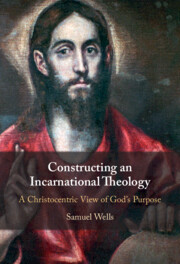Book contents
- Constructing an Incarnational Theology
- Constructing an Incarnational Theology
- Copyright page
- Dedication
- Contents
- Preface
- Introduction: Making the Story New
- Part I The Story of God
- Part II An Emerging Story
- 4 Orthodox Foundations
- 5 Medieval Debates
- 6 Modern Developments
- Part III Reconfiguring the Story
- Conclusion
- Bibliography
- Index
- Scripture Index
5 - Medieval Debates
from Part II - An Emerging Story
Published online by Cambridge University Press: 09 January 2025
- Constructing an Incarnational Theology
- Constructing an Incarnational Theology
- Copyright page
- Dedication
- Contents
- Preface
- Introduction: Making the Story New
- Part I The Story of God
- Part II An Emerging Story
- 4 Orthodox Foundations
- 5 Medieval Debates
- 6 Modern Developments
- Part III Reconfiguring the Story
- Conclusion
- Bibliography
- Index
- Scripture Index
Summary
The debate about Christ’s incarnation, and the intention behind the incarnation, is wide-ranging and far-reaching. It concerns God’s purpose and the exercise of God’s will; the identity of Christ; the reason for creation; the nature of salvation; and the destiny of humankind. The thirteenth-century Franciscans had a particular perspective on these questions, characterised by their twin emphasis on creation and incarnation. Rupert of Deutz pointed out that if the incarnation was subject to the fall, God must have intended the fall. He countered that God had always intended the Word to have an earthly role in the divine plan for the chosen people. Figures such as Bonaventure, Grosseteste and Duns Scotus amplify and qualify these issues, and Scotus concludes that Christ would have come in the maximal glory of creation – even if there had been no fall.
- Type
- Chapter
- Information
- Constructing an Incarnational TheologyA Christocentric View of God's Purpose, pp. 114 - 135Publisher: Cambridge University PressPrint publication year: 2025

